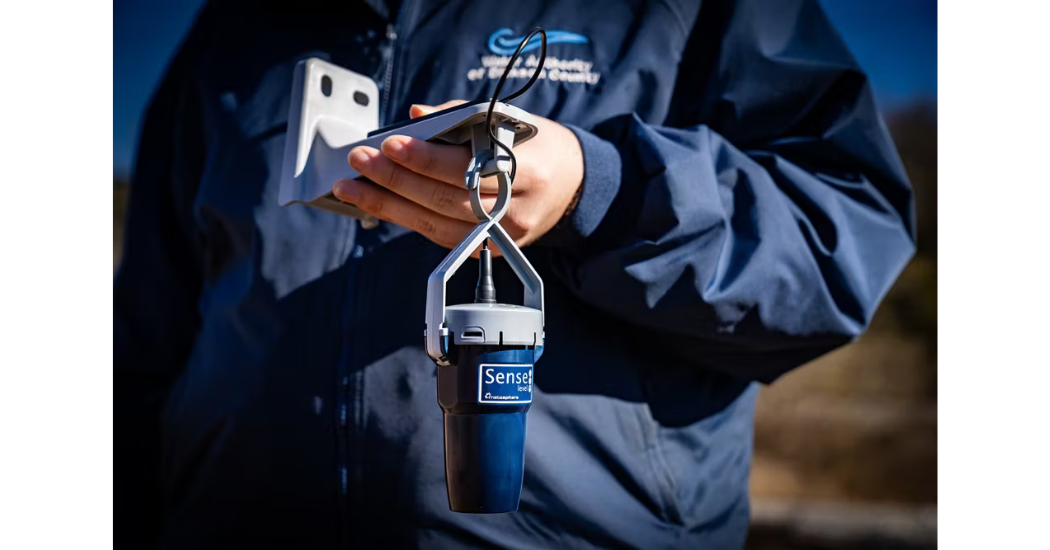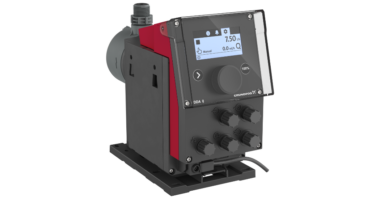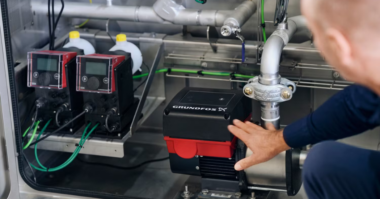In 2023, Grundfos acquired Metasphere, a leading telemetry and analytics solutions provider for water networks. Adding Metasphere’s smart water sensors to the Grundfos product portfolio will make water networks more robust, preventing spills and overflows from the wastewater collection network, which have cost municipalities $194 billion annually.
At Grundfos, we’re proud that Metasphere is part of our family of products and solutions for our wastewater networks. Their product, along with our pumps, gives us much more data, visibility, and predictions into the wastewater networks. Our goal is to prevent any types of spills or overflows from the wastewater network, which can create a public safety issue. This is a way that we can actually allow citizens and communities to rest assured that their local utility is doing everything they can to prevent those issues from occurring.
– Steve Davis, Chief Technology Officer for the Water Utility Division at Grundfos
Grundfos‘ mission is to equip both private and public entities with critical data for advanced hydraulic modeling, aiming to eradicate sewer system failures. These failures pose a significant risk to public safety, a concern that grows increasingly urgent amidst the escalating challenges of climate change and extreme weather events.
Metasphere smart water sensors help organizations prevent Sanitary Sewer Overflows (SSOs) in wastewater collection systems and storm sewer systems, including municipalities, real estate developers and homeowner associations (HOAs). Before a water or sewage overflow from a manhole occurs, the sensors detect a rise in water levels within the manhole due to equipment failures or blockages in the wastewater collection and storm sewer line and send alerts via email, text and phone.
Beyond Traditional Sensors: Metasphere’s Quick-Install, Lidar-Powered Monitoring Solution
As part of a strategic hydraulic management system, Metasphere is installed in upstream manholes to monitor and report on wastewater collection line levels before the entire system is affected by a blockage or other issue.
The sensors can also be installed in a manhole outside a municipal utility lift station to indicate whether water pumps within the station are fully functioning or having issues. Most municipal lift stations rely on multiple water pumps to keep wastewater moving upstream and when a pump goes out, water levels rise and can wreak havoc on the conveyance system.
Unlike other outdated, cumbersome water sensors that take up precious space in manholes and require hours to install, Metasphere sensors fit in the palm of your hand and are quickly mounted to the side of a manhole within an hour using two to three bolts. The sensors can also be removed easily to change device location quickly.
Once installed, Metasphere sensors are quickly programmed with a tap of a magnet and can immediately begin accurately detecting the water level of the sewer collection line with advanced LIDAR or Light Detection and Ranging technology. LIDAR works by targeting an object or a surface with a laser and measuring the time for the reflected light to return to the receiver, ensuring precise measurements.
Other sensors require a cable that extends down the manhole to detect when wastewater collection line water levels reach the sensor. This tethered cable method reduces the response time to rising water levels and increases the potential for SSOs.
Metasphere communicates water levels via a small antenna that penetrates the manhole cover. Many older sensor systems require the installation of a large antenna outside of the manhole, requiring a hole to be drilled through the manhole wall to route the cable to the antenna for communicating data to end users.
With Metasphere, end users can set custom water level thresholds, enabling the sensor to measure and alert on wastewater collection line water levels through the antenna prior to reaching the emergency threshold. Alarms can alert end users to a breached threshold via email, text, or phone call, improving response times and preventing SSOs.
To ensure continuous water level monitoring and reporting, Metasphere relies on the latest network technology and a five-year battery.
Comprehensive Dashboard Overview: Navigating System Health with Ease
Accessible via mobile device or desktop, the Metasphere dashboard provides customizable, easy-to-read real-time and historical performance data. End users can view the connected devices and their status within the water system. It also indicates whether alarms have sounded, what caused the alarm, and where level spikes and load failures have occurred. End users can gain a greater understanding of their system and resolve trouble areas.
Within the dashboard, end users can also view a map of all sensors across the system, generate trend data, identify, and track water level spikes and monitor system health. A site list enables users to drill down into each site and view a photo of the site and an image of the type of sensor installed at that specific location, providing unparalleled insight into the overarching system and each individual site.
Grundfos Metasphere Smart Water Sensor Availability
Metasphere smart water sensors are available now from Grundfos worldwide.
 About Grundfos
About Grundfos
Since 1945, Grundfos has been committed to pioneering solutions to solve the world’s water and climate challenges and improve people’s quality of life. Owned by the Grundfos Foundation (Poul Due Jensen Foundation), the company’s products for Commercial Building Services, Domestic Building Services, Industry and Water Utilities are sold in a large number of countries by local distributors. Grundfos believes that achieving diversity in the company’s workforce and talents, for instance, in terms of gender, ethnicity and work capacity, is essential to the company’s progress. Grundfos is a multi-national company with global headquarters in Denmark and the U.S. Main Office and Global Headquarters for Water Utility in Brookshire, Texas. For more information, visit https://www.grundfos.com/us and connect on LinkedIn, YouTube, Facebook and Instagram.



